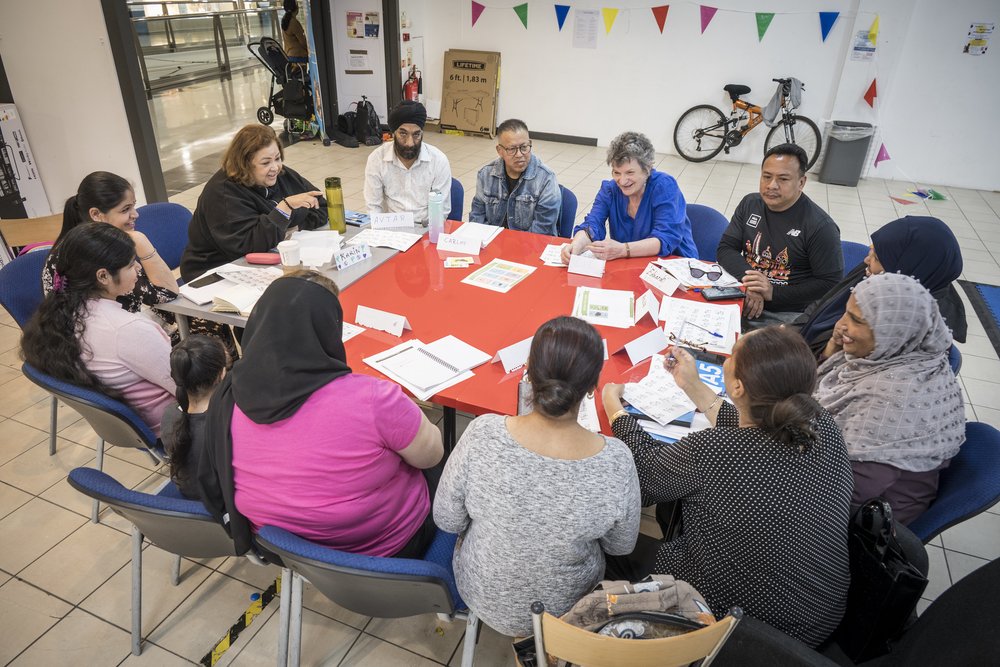by Benjamin Welby & Andy Brims

In the nondescript hotel lobby doubling as our makeshift classroom, Tariq*, a new student, lingered after class. Anxiety etched on his face, he asked:
“Am I going to be sent to Rwanda? I’ve got a domestic worker visa…my wife is pregnant.”
His fear highlighted the grim reality of navigating the UK’s asylum process. Weeks earlier, Farhan* and Ayesha*, educated professionals with children in local schools, faced sudden relocation to different temporary accommodation while their claims were processed, treated as ‘problems to be solved’ rather than people to respect.
Warm welcome
Our church, Croydon Vineyard, has taken steps to offer a warm welcome by offering conversational English classes, including directly inside asylum hotels.
Life in these hotels is far from a holiday. Conditions are basic, and asylum seekers are left in limbo for months, unable to work or plan for their future. Despite their hardships, our students remain hopeful for a safer life, and dream of sharing their talents, cultures and stories as part of British communities.
To respond to these needs we recently invited Jon to speak at a Welcoming Well roundtable bringing together those ministering to refugees and asylum seekers. The ideas we collected as a ‘Framework for Feeling at Home‘ may prove useful in identifying needs that you or your church could meet.
P0licy change
While practical action is important, we need a sea change in the national conversation about asylum. Current policies fail to uphold values of fairness, dignity, and respect. Media coverage fixates on the claim backlog, the cost of hotels, and flights to Rwanda. It ignores what happens when asylum seekers are recognised as refugees; the relief of being granted Leave to Remain gives way to further uncertainty and often the real threat of homelessness.
The crisis in our care for refugees is linked to our housing crisis, which reflects our cost of living crisis and escalating pressures on public services.
Everywhere we turn, there are worthy, deserving causes in need of love, mercy, and justice.
Redefining ‘our neighbour’
In just 12 verses, the Parable of the Good Samaritan redefines who our neighbour is. Jesus makes it clear that “neighbour” means everyone, even strangers from unfamiliar and potentially hostile lands. It’s a challenge to see the divine image in all and to love based on the outrageous compassion and generosity of Father God.
Christians may occupy a privileged place in Britain with our values having shaped our national identity but when it comes to public policy, is our voice bringing light to these conversations and the lives of those who might be ignored, mistreated, or even hated? Do the policies we support genuinely reflect Jesus’ challenge to expand our definition of neighbour, and to love them as ourselves? What would policy look like that reflects our prayer that God’s Kingdom and His love would inhabit society?
Five questions
We think these five questions could helpfully guide our engagement with asylum policy:
- How can we ensure that asylum claims are treated with respect and processed swiftly? This includes comprehensive support from day one and safe, legal pathways from abroad.
- How can we improve short-term living conditions for asylum seekers? Advocacy for generous accommodation and cash allowances, as well as church-led initiatives promoting well-being and respect.
- How can we enable asylum seekers to contribute to the economy? Advocating for the right to work and recognition of international qualifications can help asylum seekers integrate and use their skills.
- How can we provide stable, secure, and affordable housing for everyone? This involves supporting new housing proposals, investing in social housing, and holding private landlords accountable.
- How do we empower local communities to meet local needs? Renewing local government funding and fostering community initiatives can build stronger, more inclusive communities.
These reflections guide us toward a society characterised by Jesus. This journey isn’t just about a single policy domain or a party political platform, but how Christians engage in civic life. The current state of life for the most vulnerable, and our national conversation on the issues that affect them, are sorely lacking in any sign of the fruit of the Spirit.
As Christians, we must contribute to building a country that emulates the Kingdom of God – a realm defined by boundless compassion, unwavering justice and enduring hope.
This is an edited version of this original article: Welcoming Well: thinking Christianly about asylum
Benjamin Welby has spent the last 16 years working for central and local government on digital transformation and governance. He is currently co-authoring a book encouraging Christians to adopt a hope-filled, faith-inspired perspective on democracy and how we are governed.
Andy Brims is part of the team at Croydon Vineyard Church and for the last five years has directed Vineyard English School. VES provides free conversational English classes in Croydon, and has welcomed hundreds of asylum seekers and refugees since its inception in 2015.